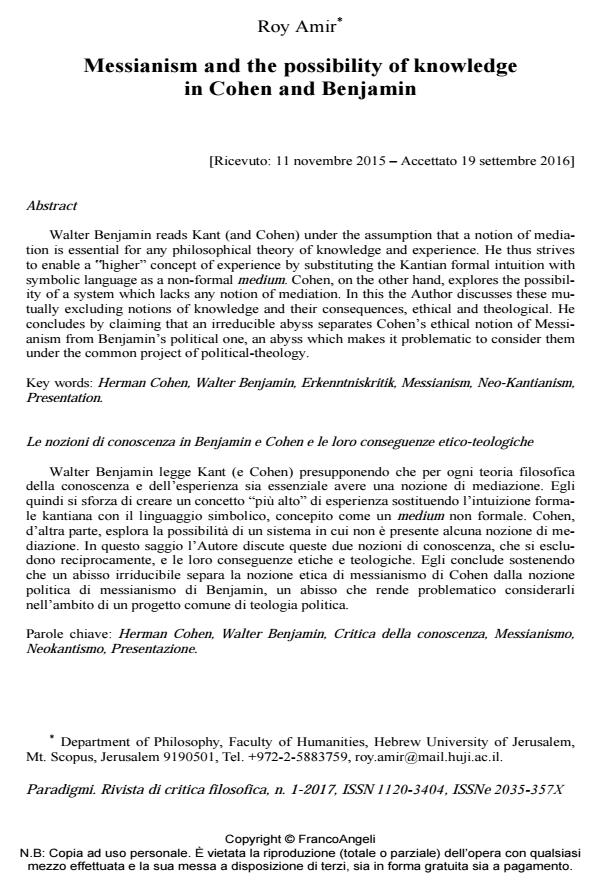Messianism and the possibility of knowledge in Cohen and Benjamin
Titolo Rivista PARADIGMI
Autori/Curatori Roy Amir
Anno di pubblicazione 2017 Fascicolo 2017/1
Lingua Inglese Numero pagine 18 P. 61-78 Dimensione file 266 KB
DOI 10.3280/PARA2017-001005
Il DOI è il codice a barre della proprietà intellettuale: per saperne di più
clicca qui
Qui sotto puoi vedere in anteprima la prima pagina di questo articolo.
Se questo articolo ti interessa, lo puoi acquistare (e scaricare in formato pdf) seguendo le facili indicazioni per acquistare il download credit. Acquista Download Credits per scaricare questo Articolo in formato PDF

FrancoAngeli è membro della Publishers International Linking Association, Inc (PILA), associazione indipendente e non profit per facilitare (attraverso i servizi tecnologici implementati da CrossRef.org) l’accesso degli studiosi ai contenuti digitali nelle pubblicazioni professionali e scientifiche.
Walter Benjamin reads Kant (and Cohen) under the assumption that a notion of mediation is essential for any philosophical theory of knowledge and experience. He thus strives to enable a ?higher" concept of experience by substituting the Kantian formal intuition with symbolic language as a non-formal medium. Cohen, on the other hand, explores the possibility of a system which lacks any notion of mediation. In this the Author discusses these mutually excluding notions of knowledge and their consequences, ethical and theological. He concludes by claiming that an irreducible abyss separates Cohen’s ethical notion of Messianism from Benjamin’s political one, an abyss which makes it problematic to consider them under the common project of political-theology.�
Walter Benjamin legge Kant (e Cohen) presupponendo che per ogni teoria filosofica della conoscenza e dell’esperienza sia essenziale avere una nozione di mediazione. Egli quindi si sforza di creare un concetto "più alto" di esperienza sostituendo l’intuizione formale kantiana con il linguaggio simbolico, concepito come un medium non formale. Cohen, d’altra parte, esplora la possibilità di un sistema in cui non è presente alcuna nozione di mediazione. In questo saggio l’Autore discute queste due nozioni di conoscenza, che si escludono reciprocamente, e le loro conseguenze etiche e teologiche. Egli conclude sostenendo che un abisso irriducibile separa la nozione etica di messianismo di Cohen dalla nozione politica di messianismo di Benjamin, un abisso che rende problematico considerarli nell’ambito di un progetto comune di teologia politica.
Parole chiave:Herman Cohen, Walter Benjamin, Critica della conoscenza, Messianismo, Neokantismo, Presentazione.
Roy Amir, Messianism and the possibility of knowledge in Cohen and Benjamin in "PARADIGMI" 1/2017, pp 61-78, DOI: 10.3280/PARA2017-001005